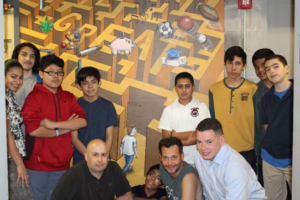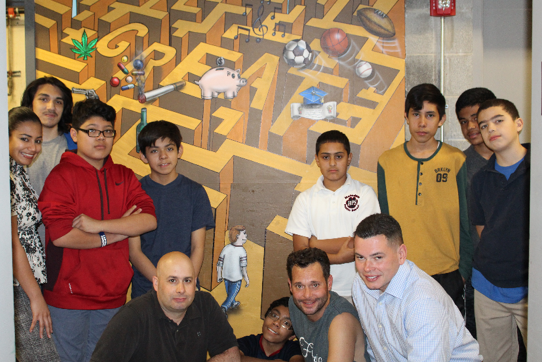 (Paterson, NJ) – The Paterson Coalition Against Substance Abuse (P-CASA) has partnered with OASIS in creating a pro-social prevention mural addressing under-age drinking and substance abuse prevention. The mural is a service learning based project conceptualized and led by local teens who envisioned the destructiveness of choosing the wrong path. Local artist and Coalition member, Samuel Salfino, worked closely with the boys to help create the empowering message conveyed through the artwork. The mural portrays the maze of life and how different choices take teens on different paths. It emphasizes how the positive choices (school, sports, family) are within the teens’ control and will lead to greater success.
(Paterson, NJ) – The Paterson Coalition Against Substance Abuse (P-CASA) has partnered with OASIS in creating a pro-social prevention mural addressing under-age drinking and substance abuse prevention. The mural is a service learning based project conceptualized and led by local teens who envisioned the destructiveness of choosing the wrong path. Local artist and Coalition member, Samuel Salfino, worked closely with the boys to help create the empowering message conveyed through the artwork. The mural portrays the maze of life and how different choices take teens on different paths. It emphasizes how the positive choices (school, sports, family) are within the teens’ control and will lead to greater success.
The timing of the mural unveiling was planned to coincide with Alcohol Awareness Month. Founded and sponsored by National Council of Alcoholism and Drug Dependence (NCADD), the aim of Alcohol Awareness Month is to help reduce the stigma so often associated with alcoholism by encouraging communities to reach out each April with information about alcohol, alcoholism and recovery. The 2016 theme, “Talk Early, Talk Often: Parents Can Make a Difference in Teen Alcohol Use” draws attention to the role parents can play in preventing teen alcohol use.
Reducing underage drinking is critical to securing a healthy future for Paterson’s youth. Surveys conducted with high school students found that 1 in 4 Paterson youth drank alcohol in the past 30 days, and 40% of youth did not think that drinking alcohol was a risky behavior. Alcohol is the most commonly used addictive substance in the United States. “The misperception among youth that alcohol use does not place them at risk is alarming, as underage drinking threatens opportunity and success for far too many of our kids. Prevention programs work best when parents, students, schools, law enforcement officials, and communities join together to fight back. We are thankful for our partnership with local community based organizations, and the support of Oasis in getting the message out,” said Dr. Robert Reid, P-CASA director.
“We are thrilled to be part of this collaboration with P-CASA,” noted Oasis Executive Director Jennifer Brady. “Our teen boys were truly engaged with this project, which included examining the choices that are presented to them every day. The mural is a beautiful representation of positive values, community support, and future success.”
The Paterson Coalition Against Substance Abuse (P-CASA) is community partnership of the Department of Family and Child Studies at Montclair State Universities College of Education and Human Services. P-CASA works with the community of Paterson’s 1st Ward to empower its members to build a safe, healthy, and drug-free environment. Learn more about P-CASA by visiting p-casa.org and about Montclair State University at http://www.montclair.edu/cehs/. Oasis is a non-profit whose mission is to change the lives of women, teens, and children by breaking the cycle of poverty through compassionate programs designed to feed, clothe, educate and empower. Learn more at oasisnj.org.







